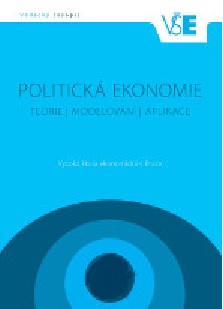Vliv relativního příjmu na mezní sklon ke spotřebě – případ České republiky
An Influence of Relative Income on the Propensity to Consume – Czech Republic Case Study
Author(s): Ondřej BaduraSubject(s): Social Sciences, Economy
Published by: Vysoká škola ekonomická v Praze
Keywords: relative income; propensity to consume; Duesenberry‘s hypothesis; income categories; dynamic panel; GMM
Summary/Abstract: This paper examines the influence of relative income on the consumption function, particularly the issue of the precise quantification of the relationship between the propensity to consume and the position of the household in the income distribution represented just by relative income. Mainstream theory of consumption, though it is aware of this effect, for its focus primarily on the aggregate consumption, it doesn’t pay much attention to this. However, if it is possible to accurately describe and quantify this so-called relative income effect, it will mean a relevant contribution to the explanation of individual consumption patterns or consumption of income categories. The aim of this work is to find, describe and precisely quantify the impact of relative income on the average propensity to consume on the example of Czech households. To achieve this goal, we use a regression estimation of the dynamic panel using GMM, where the individual panels are set as income categories of households. The results achieved unambiguously confirm the validity of the initial assumption about the existence of functional dependence of the propensity to consume on the relative income and thus it fully supports the idea of interdependent concept of utility and consumption.
Journal: Politická ekonomie
- Issue Year: 66/2018
- Issue No: 4
- Page Range: 430-449
- Page Count: 20
- Language: Czech

